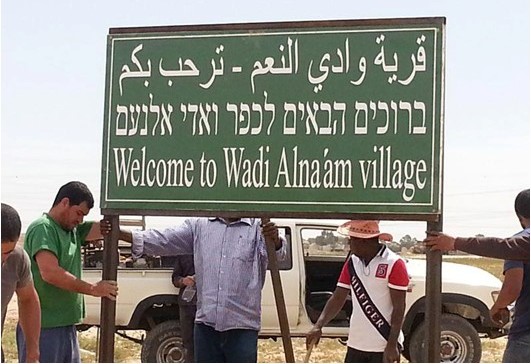Eleven unrecognized Arab-Bedouin villages in the Negev have no polling stations or public transportation and some of their thousands of residents will have to travel up to 50 kilometers to vote in the upcoming national elections on April 9. Adalah – The Legal Center for Arab Minority Rights in Israel sent a letter to Israeli Central Elections Committee Chairman Judge Hanan Meltzer and Interior Minister Aryeh Deri demanding that polling stations be placed in these Bedouin villages.
Adalah Deputy Director Attorney Sawsan Zaher detailed in her letter 11 Arab-Bedouin villages with a total population of some 40,000 residents, many of whom are required to travel dozens of kilometers from their homes – partly on foot – in order to exercise their right to vote. Many of these communities lack public transportation and many residents do not own private vehicles. Members of the al-Azazma tribe living in the village of ‘Abda, for example, must travel 50 kilometers to the government town of Segev Shalom in order to vote.
The absence of polling stations in the Bedouin villages is one of the main reasons for the low voter turnout among this population, said Adalah. The villages of Rahma, ‘Abda, al-Fur’a, Wadi al-Na’am, Umm Matnan, al-Zarnuk, Bir al- Mashash, Khirbet al-Wattan, Tel Arad, al-Ghara, and Bir al-Khammam – despite being unrecognized by the state – nevertheless all have public health services and education buildings that were approved in outline plans vetted by Israeli authorities in which the Elections Committee is being asked to place ballot boxes in these locales for the upcoming elections for the 21st Knesset.
Adalah stressed that “harming citizens’ access to polling stations constitutes a grave and disproportionate violation of the constitutional right to vote enshrined in Israel’s Basic Law: The Knesset [Israeli parliament] (Article 4). The law also stipulates that the Central Elections Committee must finance transportation for the purpose of exercising voting rights.”
Prior to the last Knesset election in 2015, the Central Elections Committee chairman rejected Adalah’s request calling to provide transportation to voters in unrecognized villages, claiming that public transportation lines situated along main highways was sufficient. However, low voter turnout figures from that election indicate that this failed to remedy the situation.
“The fact that we have to push the Israeli Elections Committee to put ballot boxes inside communities – letting every citizen exercise her or his basic constitutional right to vote – is yet another indication of Israel’s efforts to pressure Arab-Bedouin citizens to leave their homes and villages. The Central Elections Committee must allow all citizens to vote without having to embark on unreasonable journeys in order to do so,” said Attorney Zaher.



